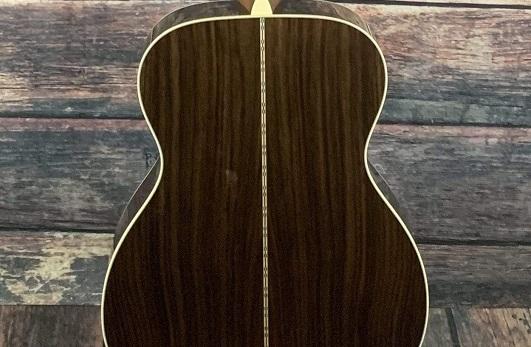Your Cart is Empty
April 10, 2020 4 min read

If you have had your eye on the musical instrument markets in recent years, you are sure to have noticed a sharp reduction in the use of rosewood in the manufacture of musical instruments. This was largely because of specific CITES restrictions on the use of all forms of rosewood in products of all kinds, including finished musical instruments, parts and accessories. When first imposed, these restrictions sent musical instrument manufacturers scrambling for viable replacement options for the popular tonewood commonly used as the backs and sides, fingerboards and bridges of many of our most iconic guitars and basses.
Musical instrument manufacturers who once used rosewood in their guitars, basses and other musical instruments were forced to explore other more environmentally friendly options as a result. Manufacturers like C.F. Martin turned to composite materials like Richlite as a substitute for rosewood boards and bridges, while other manufacturers like D’Angelico, and ESP-Takamine substituted more exotic tonewoods like Ovongkol, Cocobolo, and Macassar ebony. Other manufacturers, likeCole Clark in Australia, turned to indigenous tonewood species, making unique looking and sounding guitars.
Why Martin Uses Richlite:
In January of 2017, the CITES convention (Convention on International Trade in Endangered Species of Wild Fauna and Flora) in Geneva, Switzerland passed a ban on the use of rosewood and Bubinga as tonewoods, making it more difficult to ship or travel with musical instruments made with any amount of these endangered plant species. Prior to this, the CITES convention had already passed restrictions on the use of Brazillian rosewood, but in 2017 the ban was extended to include all forms of rosewood and certain types of bubinga.
The international agreement that formed CITES began in 1975, with the goal of ensuring that international trade involving endangered flora and fauna does not threaten the ultimate survival of these species or unduly impact the health of their ecosystems. While it is true that participation in CITES is voluntary, once a country has opted into the agreement, all of its regulations are legally binding.
The CITES restrictions on rosewood did not just affect the manufacture of new products, but also impacted the shipment of finished musical instruments made prior to the ban. Not only did manufacturers have to apply for permits and document their existing tonewood supplies, but dealers and individuals who wanted to sell instruments containing any amount of rosewood, had to apply for a CITES re-export certificate.
When an American musical instrument dealer and manufacturer wanted to ship finished instruments, parts or accessories containing rosewood internationally, they would have to check to see what permits were required. If the country they were shipping to was abiding by the CITES ban on rosewood, they would have to obtain the needed permits and certificates from the US Fish and Wildlife Service. If the products were shipped without the appropriate paperwork, they could be seized upon arrival. The entire process added cost and time to the process, causing musical instrument dealers and manufacturers a lot of serious headaches.
Brazillian Rosewood and Cites:
Even used vintage instruments containing rosewood manufactured decades before January of 2017 had to be accompanied by a CITES certificate and marked pre-convention when shipped internationally. Musicians traveling internationally with instruments containing rosewood were also subject to restrictions and could even have their instruments seized if they did not have the appropriate certificates.
CITES restrictions on rosewood and bubinga have also impacted the price of instruments. Applying for permits and certificates entails a certain cost as well as a lot of headaches for musical instrument manufacturers, dealers, and even second-hand traders, which has made the cost of instruments containing rosewood increase quite a bit.
The exemption of musical instruments, parts and accessories from the CITES rosewood ban has come as the result of a long and tireless campaign from a coalition of musical instruments manufacturers and dealers since 2016. When compared to other industries -- notably the furniture industry -- the amount of rosewood (excluding Brazillian rosewood) used to manufacture musical instruments is quite minor, and banning the use of rosewood by musical instrument manufacturers causes an undue burden that is not felt in other industries.
According to NAMM, as of November 26, 2019 the US Fish and Wildlife Service will no longer be issuing permits for musical instruments, which will essentially bring all of the headaches and problems that musical instrument manufacturers and dealers have been experiencing since the CITES ban was put in place to an end.
So rosewood -- except for Brazillian rosewood -- is back and there are many fans of this classic tone wood who could not be happier! The restrictions on finished instruments and parts that had been in place are soon to be lifted, and shipping and traveling with finished instruments and parts containing rosewood will soon be just as it was before the CITES restrictions were put in place. However, NAMM officials are still recommending that their member companies continue to work with Management Authorities to ensure that they are in compliance before shipping finished instruments, parts and accessories containing rosewood to avoid headaches for the time being. Stay tuned to our blog for more CITES-related news as this story develops!
Comments will be approved before showing up.